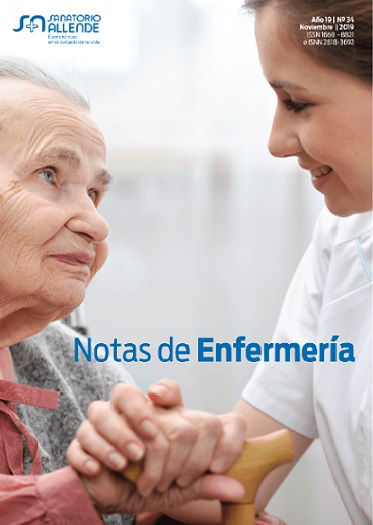Parents' feelings and ways of coping with the placement of a child in neonatology
DOI:
https://doi.org/10.59843/2618-3692.v19.n34.26323Keywords:
Feelings, ways of coping, parents, emotional impactAbstract
Abstract: The objective of this research was to evaluate and analyze the emotional impact it has on the parents of the newborn (RN) admitted to the Neonatal Intensive Care Unit (NICU). For this purpose, a qualitative study was carried out; the sample of the study was saturated when it was reached 15 responses to 15 parents of children who are interned. For the collection of information, the in-depth interview was used, which is a technique based on conversational play. Two moments were established: First moment: a table is presented with the main feelings, and experiences lived and reported by the parents and the coping
strategies identified as used. Second moment: The construct of categories that agglutinate the concepts and ideas force that interpret and analyze the phenomenon under study. they were organized around the two questions of the investigation: Question 1: Three thematic categories were built force: concern
and sadness, uncertainty and Impotence, acceptance. Question 2: Four thematic strength categories were built: emotional support networks, institutional resources, religious beliefs, learning. Results The feelings of parents with children hospitalized in UTIN, according to experience lived were of sadness, uncertainty and acceptance and recognized ways of coping were: Means of support, Institutional resources, Religiosity and Learning. We can conclude that, the emotional impact that parents go through is determined by the situation that is becoming evident rather than by the exclusive factors of the child.
Downloads
References
1.PALACIOS DIAZ Ml. Estrés En Padres Con Hijos Hospitalizados En Neonatología. San Luis 2012
2.GARCIA HIGUERA J A. La preocupación patológica y su tratamiento. Madrid España 2017
3.EKMAN PAUL. Facial Expression and Emotion». American Psychologist 1993 http:// dx.doi.org/10.1037/0003-066X.48.4.384
4.MERLE H. MISHEL Teoría de la Incertidumbre frente a la Enfermedad – Boston USA, 2013
5.TOMAS ULISES. La impotencia descripta por un psicólogo. 2014
6.CARL ROGERS Client-Centered Therapy: Its Current Practice, Implications and Theory. ILLINOIS 1944.
7.DUNKEL-SHETTER C, FOLKMAN S, LASARUS RS. Correlates of social support receipt. J Personal Soc Psychol 1987; 56: 71-8
8.CULLITON JB. Take two pets and call me in the morning. Science 1987; 237:1560-1561
9.BARRERA J. Models of social support and life stress: Beyond the buffering hypothesis. En: Cohen LH (ed.). Life events and psychologicall functioning. Theoretical and methodological issues. Newbury Park: Sage,1988; 211-236
10.BECK AT, SHAW BF, EMERY J. Terapia cognitiva de la depresión. Bilbao: Desclee de Brower,1983. (Orig. 1979.)
11.HOUSE JS, UMBERSON D, LANDIK KR. Structures and rocesses of social support. Am Rev Sociol 1988;14: 293-318
12.DRESCHER, K. Y FOY, D. Spirituality and Trauma Treatment: Suggestions for including spirituality as a coping resource. NCP Clinical Quaterly. National Center for PTSD 5 1995
13.JANOFF-BULLMANM HOROWITH. When Death Enters the Therapeutic Space 1992
14.PINTO SIERRA JOSE MANUEL, MARTINEZ SANCHEZ JORGE La teoría de Jean Piaget y el aprendizaje de las ciencias. Universidad Nacional Autónoma de México, 1994
15.CAPLAN G. Principios de psiquiatría preventiva Buenos Aires 1991
16.ARENAS LAGOS YL, SALGADO ROZO CY, ESLAVA ALBARRACÍN DG. Vivencias de los Padres de Niños Hospitalizados en la Unidad de Recién Nacidos. Bogotá Octubre de 2004 https://encolombia.com/medicina/revistas-medicas/enfermeria/ve-82/enfermeria8205-vivencias
17.REYNAGA ORNELAS LUXANA- Estres De Padres En La Unidad De Cuidados Intensivos Neonatales - Universidad Autónoma De Nuevo León Facultad De Enfermería- México 1996 Disponible.http://eprints.uanl.mx/6842/1/1080072453.PDF
Downloads
Published
Issue
Section
License
Copyright (c) 2019 Sanatorio Allende

This work is licensed under a Creative Commons Attribution-NonCommercial 4.0 International License.
Those authors who have published with this journal, accept the following terms:
- Attribution — You must give appropriate credit, provide a link to the license, and indicate if changes were made. You may do so in any reasonable manner, but not in any way that suggests the licensor endorses you or your use.
- NonCommercial — You may not use the material for commercial purposes.

